I’m sure that, like all of us, you heard a lot of things about Romania and why you shouldn’t visit this dangerous or scary country – usually, all just stereotypes that are not true.
Some are, don’t get me wrong – and this is what we’re going to talk about in today’s article: the top stereotypes about Romanians and Romania as a country and find out whether they are true or not.
I am not sure if these stereotypes are actually preventing people from coming to Romania and visiting this otherwise beautiful country, so I am here to shed some light over them.
If you’re one of the people scared about what you’ve heard from others about Romania or Romanians, it’s best to read on and learn my honest opinion – which of these stereotypes are correct and which are not.
Take my word for this: listening to some fake rumors is actually not worth losing the amazing experiences that the Carpathian Mountains, Danube Delta, Black Sea and cities of Romania can offer you.
And, if you’re not a believer, but still curious about top stereotypes about Romanians, then I’m sure that you’ll find some fun facts within this article. Let’s get it started with the stereotypes now!
1. Romanians are vampires (or at least there are vampires in Romania)

There are plenty of people out there who still associate Romania with Count Dracula and Bram Stoker’s novel. And it’s something that the country has happily embraced, as it brings in tourists and money.
You can actually visit Bran Castle, also known as Dracula’s Castle, even though the “real” Dracula never lived there. At the same time, the same legend has resulted in other preconceptions which are not true.
Rumors that Romanians are vampires or hang garlic in their houses are such stereotypes with a double effect upon tourists: scaring those who fear the supernatural, and attracting those who love dark tourism.
Anyway, it’s not true. No, Romanians are not vampires. No, Romanians do not hang garlic and onion in their houses to keep vampires away. And there are no vampires around.
And they don’t sleep in coffins.
I have a more in-depth article about Vampires in Romania, which is a great read and I am sure you will find it fun – after you’re done reading this article, that is.
Verdict: False
2. Romanians are Gypsies
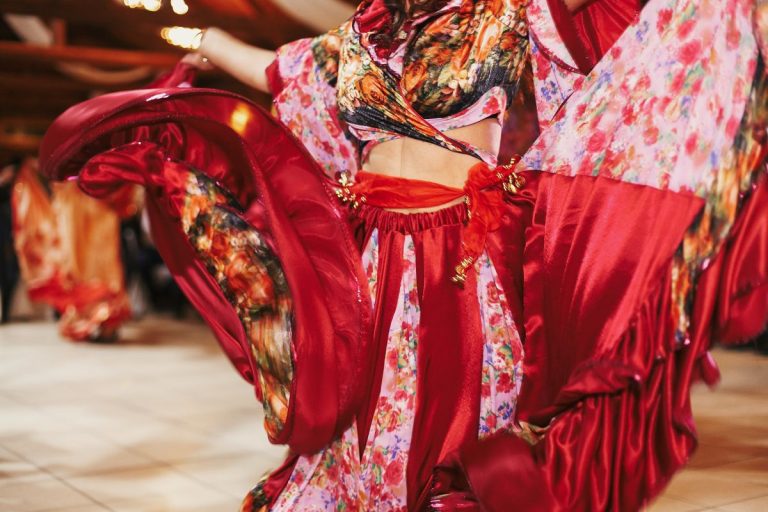
Romanians are Romanians, not Gypsies. I understand that this confusion may also come from the similarity between the two words naming the two ethnicities: Romanians vs. Romani.
From the same confusion, other preconceptions are derived.
For example, the rumor that Romanians know dark magic, read the future in coffee or see the past in palm lines, have occult rituals or wear large, colored skirts. These are things from the Gypsy culture, not the Romanians’.
Romanians have their own popular port, with folkloric and geometric motifs; and they have their own rituals and celebrations, but in no way linked to dark magic, occultism or seeing the future.
So no, Romanians are not gypsies. In fact, the Romani community represents only 3% of the population of Romania.
This is definitely not a true stereotype about Romanians.
Verdict: Not True
PS: I wrote an article in the past about why are Romanians frowned upon in Europe, and the subject of Romanians and gypsies is debated there in detail (as well as the stereotype below).
Make sure you read that article also for an even more complete understanding of the situation.
3. Romanians are thieves

There is a reputation that is quite popular amongst countries such as France, Italy, England and more, regarding the fact that Romanians are thieves. This comes partly from the previous stereotype, but not entirely.
I don’t want to go into racial debates and create stereotypes of my own, but I think it’s pretty obvious for anybody that generalizing is not a good idea, especially when matters like this one are concerned.
This is a difficult one, because there are bad people in every country out there. And it is obvious that not all of the Romanians are thieves. But also not all the Romanians are 100% honest people.
I would say that this stereotype about Romanians is not true and I can definitely find an explanation for this defamatory stereotype.
Some of the Romanians that migrate towards the above-mentioned countries go there with this exact purpose: of stealing – stealing what they cannot do in their own country.
But those people do not represent the Romanian country or people at all. In fact, Romanians are intelligent people; some of the most talented sculptors, painters, artists, doctors and scientists in Europe were/are Romanians.
Honesty, hard work and modestly are actually national values for the Romanians, and these define the nation more than any other preconception.
Plus, robbery, theft and crimes happen in any country, from time to time. This doesn’t mean that accidents are routine, or that particular cases define the people of a country.
To sum it up, Romania is a safe country, and people work hard to pay for what they want to buy/have, just like in any other civilized country.
So – Are Romanians thieves? NO – and you’ll be convinced of their hospitality if you decide to visit, but like in any country out there, we have our bad seeds.
Verdict: Not True
4. Romania is a dirty and poor country
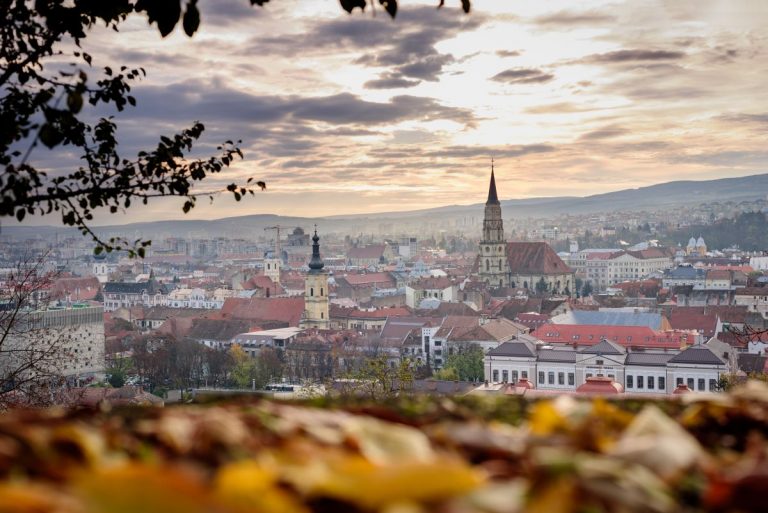
Another often-met stereotype about Romanians is that they are poor people, living in a poor country.
And while I can’t argue that Romania is not amongst the richest or most developed European countries, I also cannot agree to the fact that it is a poor country, judging at a global level.
In fact, Romania’s GDP is situated in the top 50 countries in the world, and it has the 14th position amongst the 27 European Union Countries, above countries like Portugal or Czechia (source here).
So Romania is actually a constantly developing country, with a growing economy and continuously improving life standards.
Related: Is Romania a Third World Country?
Romania’s salaries are low compared to Western Europe, but the cost of living here is also much lower so in the end, it all evens out.
So even though looking at salaries in Romania would make you frown and ask yourself how on earth are we managing to survive, that’s just part of the equation and it generally evens up with the low cost of living.
It’s also an added bonus for you, as a tourist, since other currencies (especially the US Dollar and Euro) can buy you more than in other countries.
In terms of how dirty the country is, this also varies greatly from city to city and even more, from one area of the city to the other.
But generally, Romania is relatively clean and the touristic areas or important parts of the cities here are really clean.
Verdict: Not True
5. All Romanians play the accordion and have fun with dancing bears

This one is a fun stereotype, but it is popular especially amongst the Dutch for some reason.
They believe that Romanians have fun with dancing bears because Romania is the European leader regarding the number of bears on the territory of the country.
Also, some of the touristy areas in the country – especially up in the mountains – do have (or at least did have) people with tamed bears offering the chance to get a photo with one. I know I have such a photo and probably most tourists do:
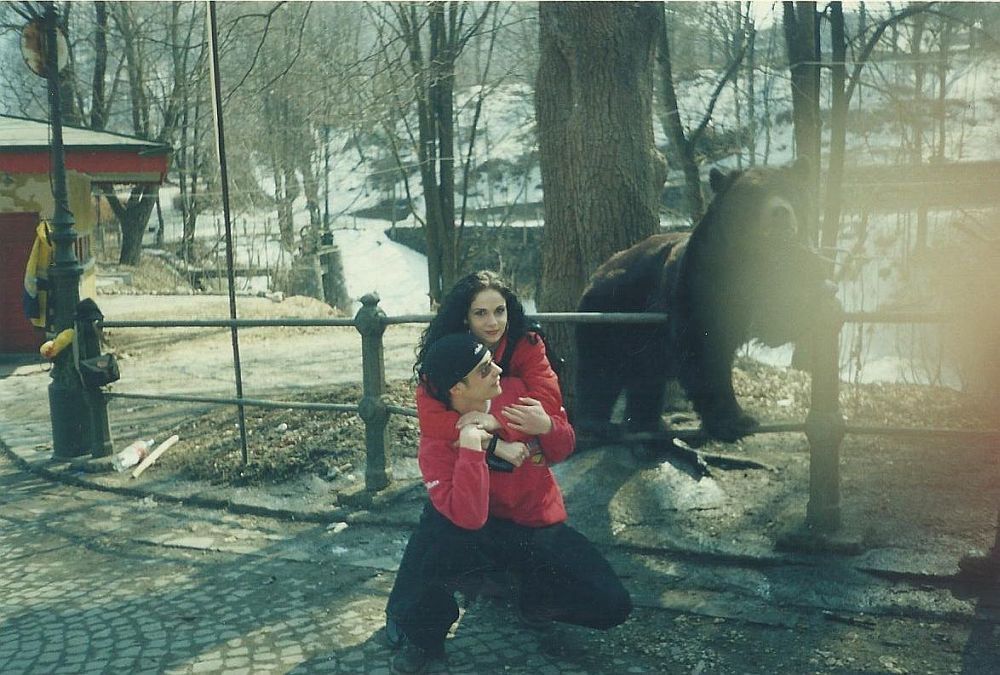
As for the accordion, they have this stereotype because of the “lăutari”, singers that are famous for their musical talent and who are known for their skill at playing the accordion.
Or maybe because lots of Romanian beggars play the accordion in public means of transport, contributing to this stereotype.
Anyway, these two explanations are not enough to characterize an entire nation of people.
Romanians do not live with the bears – although sometimes the animals do leave the mountains and the forest to visit the villages for some food.
And no, Romanians aren’t all singers and probably over 99% never held an accordion in their hands.
Verdict: Not True
6. Romania is the heaven of street dogs
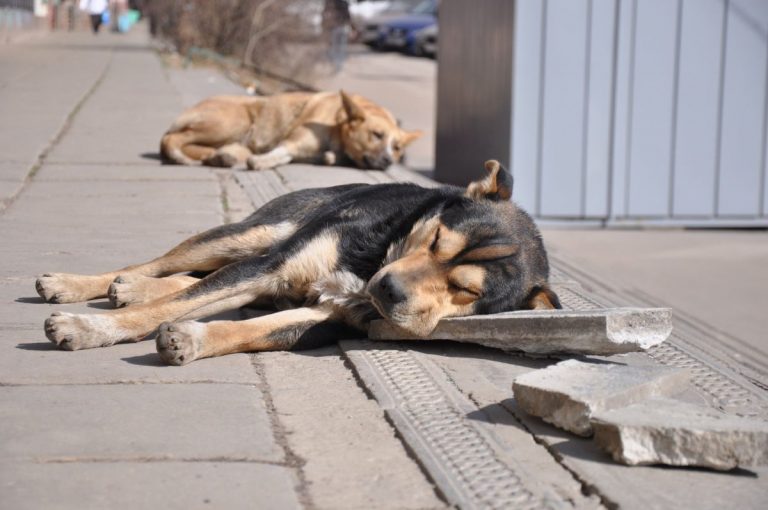
This was indeed a problem several years ago, when street dogs were wandering through the parks and public spaces of cities from Romania, day and night, even attacking people.
But measures were taken by the authorities, and today you can rarely encounter street dogs in most cities.
Stray dogs may still be found occasionally in villages or peripheral areas – but that’s it for the most part. Parks are safe for the children, green spaces as well, and streets or highways are certainly not filled with strays.
And while the problem didn’t completely disappear, chances are that most tourists coming to Romania won’t ever see a stray during their stay. But if they stay longer or visit more areas/cities, they might encounter one or three.
I have a more in-depth article about Romania and stray dogs in case you want to read more on the subject.
Verdict: Partially True
7. Roads in Romania are terrible
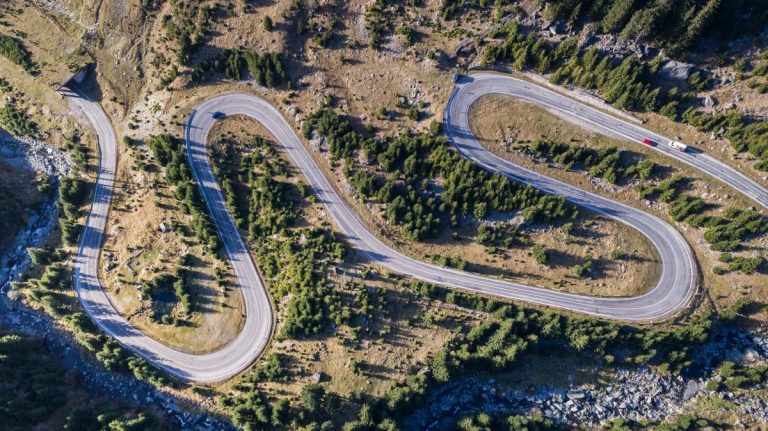
It is true that the transport infrastructure is not the best in Romania and the Romanian drivers are usually reckless and aggressive.
But calling all roads in Romania “terrible” (or anything like that) is a bit exaggerated.
Sure, we don’t have many highways and express roads and such (probably the lowest number of KMs in the European Union in this area), but most roads are at least decent, albeit crowded.
But some go as far as saying that roads are not paved, but filled with dust or rocks; that people ride horses on streets and drive carts. And this is certainly not true.
Even the villages started paving more and more roads (this is where most dirt roads are found) and the government is building – even though slowly – more highways and better roads.
Romanians drive cars and bikes, or they use trams, trains, buses, metros and even ships for transportation.
Under no circumstances will you see people riding horses in the capital of Romania or in other cities. It’s actually not allowed for horses (or horse-drawn carriages) to be on the roads in cities.
Sure, some choose to keep the tradition and still own horses that they sometimes use to pull their carts, but this is usually done in villages and part of the charm.
Verdict: Partially True
8. Corruption is the norm in Romania

How many times have you heard the sarcastic affirmation that Romania is “the country of all possibilities/where anything is possible”?
Well, it’s being said by the locals for a reason: they are often frustrated by the abuses done by the authorities with no logical explanation. And this is definitely a form of corruption.
Even so, this is a very subjective matter. Not all Romanians are corrupted: I would say most of them are honest people.
In fact, this is a matter that’s being worked on and has seen great improvements over the years, especially in the healthcare system.
If, few years ago, bribing was mandatory in hospitals if one wanted good treatment, today accepting money or any type of favor/ gift/ object from the patient will bring serious consequences to any doctor/ nurse/ assistant etc.
In all other areas, measures are taken against corruption and things are much, much better than they were 10, 20 or 30 years ago.
This doesn’t mean that corruption has been reduced to zero, but it is an improvement that reinforces the affirmation that definitely not all Romanians are corrupted.
Verdict: Partially True
9. Romanians are communists
Many still believe that Romanians are communists or that the country is still a communist one.
This was true. For quite a while. And the Communist regime left a deep imprint upon the culture, mentality and behavior of the Romanians.
But Romania has been a democratic country since December 1989 when Nicolae Ceausescu was overthrown and people have evolved a lot since.
Sure, there still is a quite important number of seniors who still support and mourn the communist age; but the new generations come with a fresh mentality and a new point of view, with an open mind and a democratic attitude.
They embrace the modern and under no circumstances are communists, even though, just like in other countries, populist, far right (or far left) parties are starting to become more and more popular.
Verdict: Not True
10. The Romanian language is very similar to Russian…

…and most people speak it.
As a stereotype, this makes sense due to Romania’s geographical location. It’s close to Russia, Ukraine, it has Serbia and Bulgaria to the South using the Cyrillic alphabet… but despite of these, the Romanian language is very different and Romanians use the traditional Latin alphabet.
Actually, Romanian is a Romance language, having more in common with Italian, Spanish, French and Portuguese than Russian.
This doesn’t mean that there are no Russian influences – we do have many words coming from that region, but it’s not the dominant influence.
And regarding people speaking Russian – that is definitely not true and most Romanians can’t say a word in Russian.
Sure, those living in the Moldova region (which is closer to Russia) might speak and/or understand more Russian than others, but this is not a language that is normally taught in schools and very few people speak it or understand it.
Verdict: Not True
11. Romania is a Balkan country
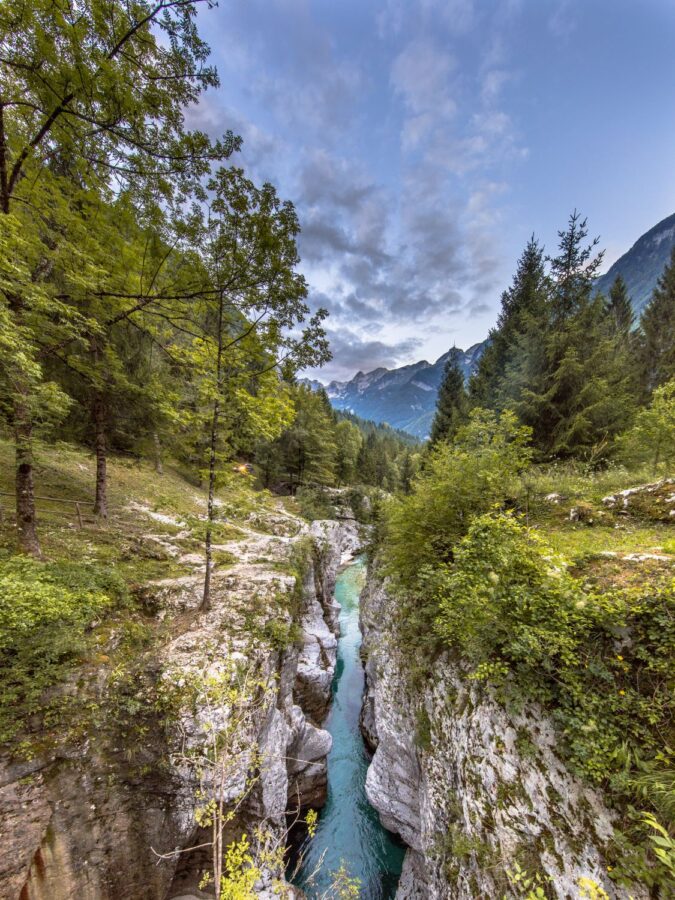
This is again based on location, and Romania is not the only country that is considered to be part of a region that it’s actually not part of.
The Balkan Peninsula is generally considered (at least by Romanians) to end at Romania’s southern border. Therefore, Romanians (or most of them) consider themselves Easter Europeans, and not from the Balkans.
Even the Encyclopedia Britannica list Romania as part of the Balkan countries and that might be officially correct. I have no idea, honestly – but as a local, I know for sure that most Romanians don’t consider the country to be a Balkan one. (Not that it matters).
Verdict: Difficult to say
Conclusion
Although there might be at least a kernel of truth in each of the stereotypes mentioned above, I think it’s absolutely clear that most of them are not true and are only spreading a negative image about Romanians and their country.
But this is what stereotypes do.
So, as a conclusion, I would like to kindly remind you that Romania is a wonderful country with plenty of things to do and see, where you will have an amazing experience if you choose to visit due to both the impressive destinations and the hospitable, lovely people.
Because, no matter what others may think, most Romanians are warm-hearted, welcoming, honest, hard-working people.
- Visiting the Peles Castle in Romania: Everything You Need to Know - April 11, 2024
- Is Romania in the EU (European Union) and Schengen? - April 9, 2024
- You Might Want to Think Twice Before Buying from Romania’s Farmers’ Markets! - March 27, 2024

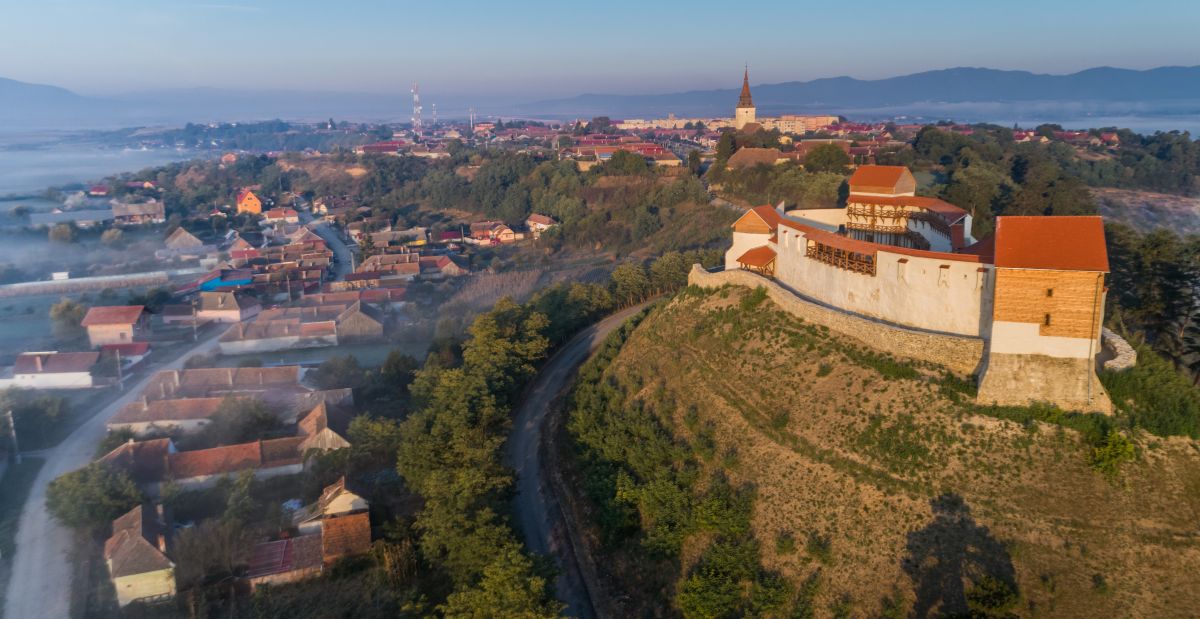
I wanted to comment that I have never heard the dancing bear stereotype. That’s just silly.
Now, about the stray dogs. Back in 2005 when I visited for the first time, there were ALL KINDS of dogs EVERYWHERE when I was in Brasov. It’s MUCH better now. But in 2011, a dog did follow me and my friend all over Bucharest (we were coming back from paddle boating in the evening there at I think it was Herestrau) and wouldn’t leave until were forced to get on a local bus to keep him from following us. My last visit to Bucharest in 2018, definitely had less dogs. Indeed, I can’t recall seeing any stray dogs on my last visit.
Now for me, the biggest stereotype I had facing me amongst my American friends, back in 2005, was that I was going to Romania to adopt children. MANY people asked me if that’s why I was going. They didn’t even think of this country as a place to vacation. So when I returned, I showed them all the photos of I took and they saw how beautiful the country is. So that helped them realize that it was a good place to vacation. I should point out though that this question was only asked by people who are not normally travelers. My friends who did travel or had been there already, knew it was a good place to vacation.
So there you have it. My stereotype as viewed by my American friends of Romania!
Haha, yes, I remember the random strays that would “adopt” you and follow you indefinitely. Fortunately, these were the friendly type.
Regarding the adoptions – I clearly remember this. And it was not completely false, as there was indeed a time when many people came to adopt Romania’s orphans. But I think that this stereotype is no longer valid – and for many years now. But I do remember watching tv shows and such about this practice.
Also, thank you for doing so much to promote Romania and its beauty to your friends!
This is a great post. I have heard the stereotypes most definitely, especially the top three. People have to understand that there are always some bad apples that spoil the barrel and it kind of sucks for a whole country to be painted by the same brush. I hear the bs about Nigeria all the time too. Some people are just lazy and can’t be bothered to dig deeper :-).
I guess that there’s a reason why most (if not all) stereotypes appear, but truly believing that all people are one way or another is definitely wrong. Indeed, there are bad seeds everywhere…